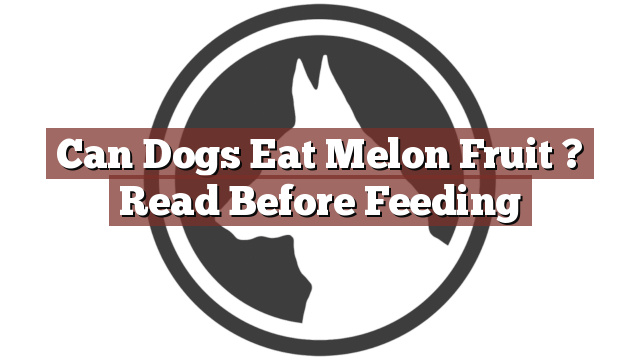Understanding Your Dog’s Dietary Needs
As a responsible dog owner, it is crucial to have a good understanding of your furry friend’s dietary needs. While dogs primarily thrive on a diet that includes high-quality dog food, they can enjoy some fruits and vegetables as well. However, it is essential to remember that not all human foods are safe for dogs. Some can even be toxic and harmful to their health. Therefore, it is important to educate yourself about what foods are safe and beneficial for your canine companion.
Can Dogs Eat Melon Fruit? Read Before Feeding
Can dogs eat melon fruit? The answer is a resounding yes. Melons, such as watermelon, cantaloupe, and honeydew, can be a healthy and refreshing treat for your furry friend. These fruits are low in calories and full of vitamins and minerals that can provide various health benefits to your dog. However, there are a few important considerations to keep in mind before feeding melon to your furry friend.
Firstly, always remove the seeds and rind from the melon before giving it to your dog. While the flesh of the fruit is safe for dogs to consume, the seeds and rind can be a choking hazard or cause digestive issues. Additionally, moderation is key when it comes to feeding melon to your dog. Too much fruit, even a healthy one, can lead to an upset stomach or diarrhea. It is always best to introduce new foods gradually and observe how your dog reacts to them.
Pros and Cons of Feeding Melon to Your Dog
Feeding melon to your dog can have several benefits. Melons are a great source of hydration due to their high water content, which can be especially beneficial during hot summer months. Moreover, melons are rich in vitamins A and C, which can support your dog’s immune system and contribute to their overall health. The natural sugars found in melons can also provide a sweet and tasty treat alternative to processed dog treats.
However, it is important to be aware of the potential drawbacks as well. While melon is generally safe for dogs, some dogs may have sensitive stomachs or be prone to allergies. In such cases, even a small amount of melon can lead to digestive upset or allergic reactions. Therefore, it is recommended to consult with your veterinarian before introducing melon or any new food into your dog’s diet, especially if your dog has any pre-existing health conditions.
Conclusion: Is Melon Fruit Safe and Beneficial for Dogs?
In conclusion, dogs can eat melon fruit as part of a balanced and healthy diet. However, it is crucial to ensure that the melon is prepared correctly by removing the seeds and rind. Moderation is key, and it is always wise to observe your dog’s reaction to any new food. While melon can provide hydration and essential vitamins, it is important to consult with your veterinarian if your dog has any health concerns or sensitivities. By being mindful and informed about your dog’s dietary needs, you can make the right choices to keep them happy and healthy.
Thank you for taking the time to read through our exploration of [page_title]. As every dog lover knows, our furry friends have unique dietary needs and responses, often varying from one canine to another. This is why it's paramount to approach any changes in their diet with caution and knowledge.
Before introducing any new treats or making alterations to your dog's diet based on our insights, it's crucial to consult with a veterinarian about [page_title]. Their expertise ensures that the choices you make are well-suited to your particular pet's health and well-being.
Even seemingly harmless foods can sometimes lead to allergic reactions or digestive issues, which is why monitoring your dog after introducing any new food item is essential.
The content provided here on [page_title] is crafted with care, thorough research, and a genuine love for dogs. Nevertheless, it serves as a general guideline and should not be considered a substitute for professional veterinary advice.
Always prioritize the expert insights of your veterinarian, and remember that the health and happiness of your furry companion come first.
May your journey with your pet continue to be filled with joy, love, and safe culinary adventures. Happy reading, and even happier snacking for your canine friend!

